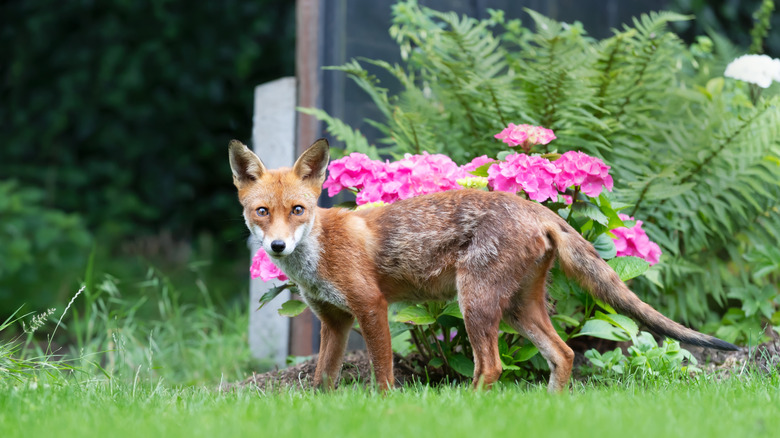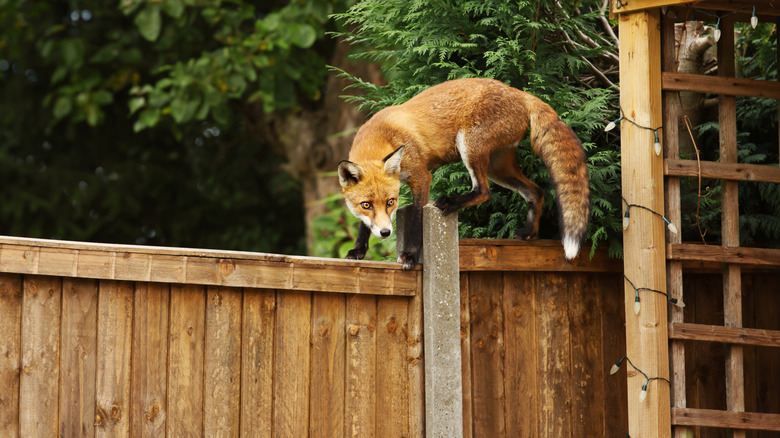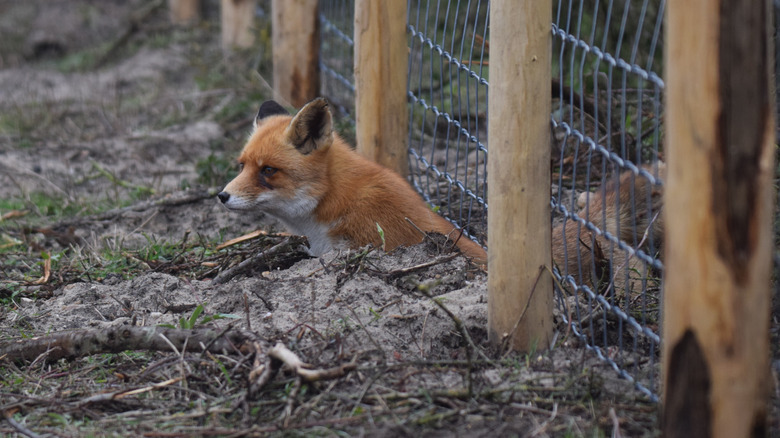Can Foxes Climb Fences And Ruin Your Garden? What To Know
Maintaining a garden requires a constant balance of attracting biodiversity and not attracting too many undesired animals — meaning animals that could cause harm to your plants, pets, or property. And while foxes may look majestic from afar, they can definitely fall into the latter category. If you were hoping your fence would keep foxes at bay, there's both good news and bad news. The bad news is that foxes can easily climb fences. The good news is that there are simple additions you can make to your fence to keep even determined foxes away from your garden.
Foxes are highly skilled climbers. Not only that, but they can jump quite high and will also use nearby objects as leverage to get over a fence if they can't clear it on their own. If they can't get over it, they may get under it by digging below the fence.
But will they ruin your garden? The occasional fox in your yard may not be such a bad thing — they hunt rodents and increase biodiversity. But there are valid reasons to want to keep them out. Foxes can leave a big mess behind, including urine, poop, and unsightly holes in the ground. They may harm small pets or farm animals, such as chickens, and can spread diseases to dogs. And if you have a bird feeder, they can easily scare the birds away. A fence alone won't keep foxes out of your yard, but a properly equipped fence can definitely help.
Making a fence fox-proof
To be effective against foxes, a fence needs to be at least 6 feet tall. But since foxes can jump or find leverage, height alone isn't necessarily enough to foil them. A secret to banishing foxes is to install an additional barrier on top of the fence. One option is "coyote rollers," which are tubes that go on top of the fence. They spin when animals try to climb over the edge, sending the critters right back to the ground. Another option is an overhang that faces outward.
Additionally, it's essential to block foxes from digging underneath the fence by burying it at least 1.5 feet deep. Alternatively, you can add 1.5 feet of chicken wire or hardware cloth. Either bury it underneath the fence or angle it outward to prevent digging. Make sure that your fence is made of a sturdy material rather than something like chicken wire, though. If you have to use a wire fence, it should be thicker than 0.9mm gauge and have holes no smaller than 3 inches by 3 inches to prevent foxes from chewing or squeezing through. Instead of wooden posts, use steel if possible, as it's harder for foxes to climb. An electric fence can also help protect your yard from foxes, but it's most effective when combined with other fencing, such as wire netting, to keep foxes from pushing through the bottom.
Is fencing enough to keep foxes out?
Fencing on its own is often not 100% effective at keeping foxes out because even a single weak spot or gap can provide a way through. Regularly checking and repairing your fence is a must. So if foxes have been a nuisance in your area, you may need to take other measures too. Foxes are typically attracted to gardens and yards for two reasons: food and shelter. They may snack on trash, pet food, bird feeders, livestock, rodents, or bee hives. Or they may look for a place to dig a den for their young. To truly deter foxes, you'll have to eliminate as many of these temptations as you can.
In addition to securely fencing your garden, block off any crawl spaces under buildings or decks where foxes may want to den. Keep pet food and water bowls indoors, regularly clean up any fallen fruit or birdseed, and make sure your trash and compost bins are secure against pests. This also cuts down on rodents, which in turn cuts down on the foxes who hunt them. Lastly, never feed foxes (or any other wild animals for that matter).
If you're still having trouble, other measures can help deter foxes, like keeping your garden lit at night, using motion-activated lights, or using noise-making devices. But the animals will get used to these deterrents after a while, so they're not foolproof long-term. Instead, call a professional to help with a chronic fox problem.


